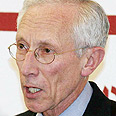
Fischer, who never speaks out on political issues, referred to the economic damage caused by the war. He actually had positive messages to relay. He emphasized, "It is already obvious that we will not achieve all our objectives, but we will hope to achieve as much as possible."
During his speech Fischer said: "The war won't have any meaningful negative impact on the economy assuming that we continue fighting for not more than another month and that it ultimately results in a good agreement that will improve our security situation."
The governor was asked by the surprised finance writers if in his opinion the government needs to take the economic expense into account when deciding the length and extent of the operation in Lebanon.
"Even though I am an economist, I am first and foremost an Israeli citizen," Fischer responded. "If there is a serious threat to the country, economic risks need to be taken and to say sometimes that yes it will cost money, but it will save and improve the security situation and will prevent bigger troubles in the future, including economic troubles."
During his speech, Fischer said that the government could finance war expenses from surpluses that have accumulated in 2006, and from compensation funds at the discretion of the Property Tax Authority that aren't in the budget.
Fischer clarified that as long as the fighting doesn't continue for more than a month, there won't be any need to make cutbacks in the 2007 budget.















